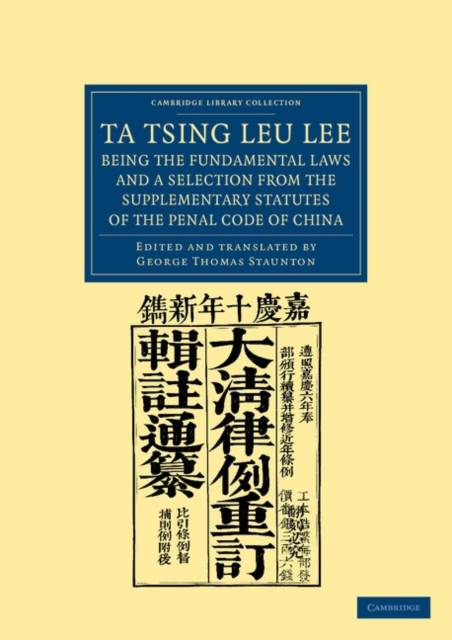
- Afhalen na 1 uur in een winkel met voorraad
- Gratis thuislevering in België vanaf € 30
- Ruim aanbod met 7 miljoen producten
- Afhalen na 1 uur in een winkel met voorraad
- Gratis thuislevering in België vanaf € 30
- Ruim aanbod met 7 miljoen producten
Zoeken
Ta Tsing Leu Lee; Being the Fundamental Laws, and a Selection from the Supplementary Statutes, of the Penal Code of China
€ 149,95
+ 299 punten
Omschrijving
The sinologist George Thomas Staunton (1781-1859) learned Chinese as a child and accompanied his father on a trip to China in 1792 where, though the Ambassador's page, he was the only member of the delegation who could speak to the emperor in Chinese. A career in the East India Company's Canton factory followed, and he translated many texts between Chinese and English, including this penal code, published in 1810, which was its first translation into any European language. The 'Fundamental Laws' was the legal code of the Qing Dynasty (1644-1911), and contained more than 1,000 statutes. Staunton organised his translation of a selection of the laws into seven divisions: general, civil, fiscal, ritual (religious), military, criminal, and public works. He also includes an appendix with translations of edicts regarding matters such as punishment, making this compendium an invaluable guide to the complex legal regime of the Qing Dynasty.
Specificaties
Betrokkenen
- Vertaler(s):
- Uitgeverij:
Inhoud
- Aantal bladzijden:
- 670
- Taal:
- Engels
- Reeks:
Eigenschappen
- Productcode (EAN):
- 9781108045865
- Verschijningsdatum:
- 26/04/2012
- Uitvoering:
- Paperback
- Formaat:
- Trade paperback (VS)
- Afmetingen:
- 210 mm x 297 mm
- Gewicht:
- 1578 g

Alleen bij Standaard Boekhandel
+ 299 punten op je klantenkaart van Standaard Boekhandel
Beoordelingen
We publiceren alleen reviews die voldoen aan de voorwaarden voor reviews. Bekijk onze voorwaarden voor reviews.










